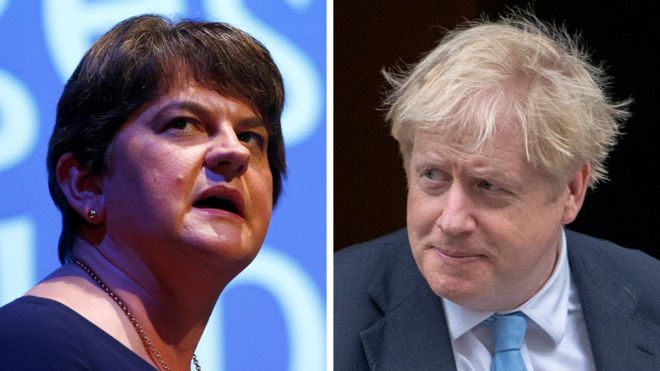International
Brexit: DUP rejects deal ‘as things stand’ as PM heads to EU summit

Boris Johnson has suffered a blow to his proposed Brexit deal as the Democratic Unionist Party said it cannot support plans “as things stand”.
The support of the Northern Irish party is seen as crucial if the PM is to win Parliament’s approval for the deal in time for his 31 October deadline.
The DUP said it would continue to work with the government to try to get a “sensible” deal.
It comes as Mr Johnson heads to a crunch summit to get the EU’s approval.
The BBC’s Europe editor Katya Adler said EU ambassadors had expected to get a copy of the legal text of a deal this morning, but it had not arrived.
One EU diplomat told her: “We are more and more pessimistic.”
The PM spoke to the European Commission President Jean-Claude Juncker ahead of the meeting, with the EU’s chief spokeswoman tweeting: “Every hour and minute counts before the [summit]. We want a deal.”
And German Chancellor Angela Merkel said negotiations were “on a better path now”, but added: “Let me say clearly this morning, we haven’t reached the goal.”
The UK government has yet to approve any legal text and the DUP remains unhappy about elements of the prime minister’s revised plan for Northern Ireland.
In a joint statement released on Thursday, the DUP’s leader and deputy said discussions with the government were “ongoing”, but “as things stand, we could not support what is being suggested on customs and consent issues and there is a lack of clarity on VAT”.
“We will continue to work with the government to try and get a sensible deal that works for Northern Ireland and protects the economic and constitutional integrity of the United Kingdom,” Arlene Foster and Nigel Dodds added.
Housing Secretary Robert Jenrick said it was a “very sensitive moment in the negotiations”, and while there was still a “possibility” of a deal, it required “more hard work and more pragmatism on all sides”.
Mr Johnson’s proposals for a new Brexit deal hinge on getting rid of the controversial backstop – the solution to Irish border issues agreed by former PM Theresa May which proved unpalatable to many MPs.
However, his plans would see Northern Ireland treated differently from the rest of the UK – something the DUP, among others, has great concerns about.
The DUP has helped prop up the Conservative government since the 2017 general election.
In the past, a number of Tory Brexiteers have said their own support for a Brexit deal was contingent on the DUP’s backing of any agreement.
The view from the UK…
The decision by the DUP to reject Mr Johnson’s deal is a potential body blow.
Not only would it seem to scupper the PM’s prospects of securing a deal in Brussels today, but it also suggests he would be unable to win any subsequent vote in the Commons.
In their statement, however, the DUP do not quite close the door to a possible compromise in the future, implying were there further concessions, they might be won round.
It’s understood issues around securing the consent of the Northern Ireland Assembly, Stormont, to the new customs regime have become paramount.
The fear in the DUP is that under the simple majority vote required by the EU to ensure continued membership of the new customs arrangement, the unionist community would have no veto.
So they worry they could remain trapped in an arrangement where increasingly the political and economic pull would be towards Dublin and Brussels, rather than London – threatening their core belief in the union.
The BBC has learned that the draft Brexit deal has a mechanism enabling the Northern Irish Assembly to approve or reject the border plans.
This would give the Stormont Assembly the chance to vote on Brexit arrangements four years after the Brexit transition period ends in 2020.
But the DUP has demanded assurances around this so-called consent mechanism.
Mr Jenrick said there would be more “intensive” work in the “coming hours and days” to reassure parties.
He told BBC Radio 4’s Today programme: “Movements and compromises have been required, but we are close to an agreement.
“We now need to go back and see what more we can do to persuade each side so we can get this done.”
Mr Jenrick added: “It would be a huge missed opportunity to miss this chance to get Brexit over the line and to move on with the life of the country.”
As well as the DUP, Mr Johnson is trying to secure support from Tory Brexiteers, most of whom are part of the European Research Group.
ERG chairman Steve Baker said on Wednesday evening his group “hope [to] be with the prime minister, but there are thousands of people out there who are counting on us not to let them down and we are not going to”.
The Irish Prime Minister Leo Varadkar has said that if a deal cannot be completed at the two-day summit, European leaders could gather again before the end of the month to continue Brexit talks.
Mrs Merkel told the German Parliament on Thursday there had been “significant movement”, but there were still questions around customs plans.
“We have to and we will do everything to make this negotiation a success,” she said.
“An orderly Brexit is still possible and we will negotiate until the last second. If necessary, we can call a special summit, but let’s see where we get.”
The view from the EU…
This morning’s statement from the DUP throws into jeopardy the planned choreography of the summit, which would have seen Boris Johnson and the 27 other leaders approve a revised Brexit deal when they met this afternoon.
But the EU’s been here before with Theresa May, and knew that support for the deal at Westminster wasn’t guaranteed.
That’s why negotiators tried to address the concerns of the DUP – and the unionist community in general – in the new text of the agreement, with a promise that some goods crossing the Irish sea would be exempt from customs checks and by giving Stormont a choice about how Northern Ireland is treated in future.
But the EU says it could never give the Northern Ireland Assembly an up-front veto over the arrangements coming in to force in the first place.
And that’s one of the DUP’s big demands.
Mr Johnson faces another deadline on Saturday – the date set out in the so-called Benn Act, which was passed last month by MPs seeking to avoid a no-deal Brexit.
If MPs have not approved a deal – or voted for leaving the EU without one – by Saturday, then Mr Johnson must send a letter to the EU requesting an extension to 31 January 2020 – something he has repeatedly refused to do.
On Wednesday, Brexit Secretary Stephen Barclay confirmed Mr Johnson would write such a letter if no deal was in place by Saturday.
The prime minister’s official spokesman confirmed the government will table a motion for Parliament to sit this Saturday from 09:00 to 14:00 BST.
However, this does not mean the House of Commons will definitely sit on Saturday – the government could table the motion but not push it to a vote.
Former Attorney General Dominic Grieve – who wants any new deal to be put back to the public to approve – said it was not “realistic” for the prime minister to expect Parliament to scrutinise and approve a legal text on Saturday – even if Mr Johnson does manage to finalise the plan with the EU.
Source: BBC



